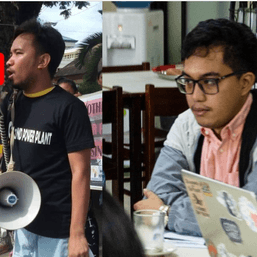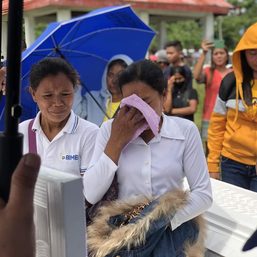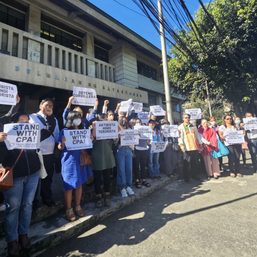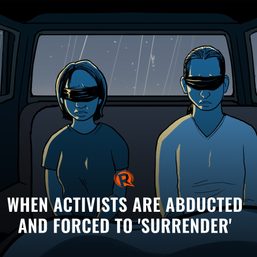SUMMARY
This is AI generated summarization, which may have errors. For context, always refer to the full article.
Activists sent another pleading to the Supreme Court on Monday, October 26, asking the justices to stop the implementation of the anti-terror law as soon as possible, saying it “may even spell the difference between life and death.”
The National Union of Peoples’ Lawyers (NUPL) said in a motion submitted on Monday on behalf of activist petitioners that this is especially so “for individuals in the crosshairs of those intolerant of dissent and divergence.”
The pleading asks for the issuance of a temporary restraining order (TRO) or a preliminary injunction.
With the release of the implementing rules and regulations (IRR), the feared anti-terror law would now be implemented full-swing.
Look at Parlade
The activists brought to the Supreme Court’s attention the recent intensive red-tagging campaign of military general Antonio Parlade Jr not only against known activists, but also against celebrities like Angel Locsin, Liza Soberano, and Miss Universe Catriona Gray.
Miffed by Soberano’s participation in an online webinar by women’s group Gabriela, Parlade posted a social media statement warning that the young actress may “suffer the same fate” as Josephine Ann Lapira, a young activist who was killed in 2017.
“The petitioners, their organizations and party-lists, and members thereof have been consistently red-tagged and labelled without any due process and sans competent, credible and admissible evidence as either ‘terrorists’ or ‘terrorist front organizations’ by the NTF-ELCAC (National Task Force to End Local Communist Armed Conflict), most viciously by one Gen. Parlade,” said the NUPL.
According to the pleading, if there’s no relief soon, the petitioners would become “vulnerable targets.” (READ: On social media, PH military declares war vs rights defenders)
“We are now in receipt of verified information that individuals were already recently arrested, charged and remain detained up to the present time on the basis of, among others, the Anti-Terror Act even before its IRR was issued,” said the NUPL.
Chief Justice Diosdado Peralta said that the Court would be able to decide by the middle of November when they would schedule the oral arguments.
It has been 3 months since the anti-terror law became effective; there had been 37 petitions filed since, but Peralta said the justice-in-charge would still have to identify the common issues among the petitions to come up with a grouping that would make the oral arguments orderly.
The NUPL said that injunctions do not determine the merits of the case. The lawyers pleaded the Supreme Court to issue an injunction for it to “protect its ability to render a meaningful decision.”
For the NUPL, even if the petitioners eventually win the case, if the anti-terror law is not stopped now, the possible victory would still be “at a great and terrible cost.”
“Indeed, such a resolution – even if favorable to the petitioners – would be one reached at a great and terrible cost if it were to come only after people have already been arrested without court- issued warrants, detained without charge, prosecuted and convicted for exercising civil and political rights, or have had their privacy intruded into or their properties seized, all without even the basic rudiments of due process,” said the NUPL. (READ: In battle for civil liberties, Supreme Court is needed now more than ever)
Red-tagging
The anti-terror law authorizes the powerful anti-terror council (ATC) to designate groups and people as terrorists, for the purposes of freezing their assets. But some petitioners fear that designation would be used to arrest and detain those people and groups – as warrantless arrest and detention are also powers of the council.
Justice Undersecretary Adrian Sugay said the anti-terror council would be more careful than the NTF-ELCAC in making its decisions.
Sugay said that as far as he knows, Parlade does not serve any capacity in the anti-terror council. But National Security Adviser Hermogenes Esperon Jr, who is the NTF-ELCAC’s vice chairman, is also the vice chairman of the anti-terror council.
“Kapag sa NTF-ELCAC kasi I don’t know maybe that’s a propaganda thing, I don’t know, PR whatever, but dito kasi once they start designating, yung ATC, matindi na ‘yung legal consequences nun eh, marami nang kasunod, so I would like to think that in this case, the ATC will really be very deliberate and will do its work carefully,” Sugay said over Rappler’s podcast Law of Duterte Land.
(With the NTF-ELCAC I don’t know maybe that’s a propaganda thing or I don’t know, PR or whatever, but here when the ATC starts designating, the legal consequences are very grave and a lot of things will follow so I would like to think that in this case, the ATC will really be very deliberate and will do its work carefully.)
Activists have earnestly been trying to prove to the Court that red-tagging by the military is directly linked to the harassment and murders of their members. But courts usually refuse to acknowledge the direct link. This has prompted mounting calls to strengthen the rules on extraordinary writs of amparo and habeas data.
Recently killed activist Zara Alvarez was viciously red-tagged and was included in a Department of Justice proscription for a terrorist case. She failed to get a protective writ from the Court before her murder. – Rappler.com
Add a comment
How does this make you feel?










There are no comments yet. Add your comment to start the conversation.